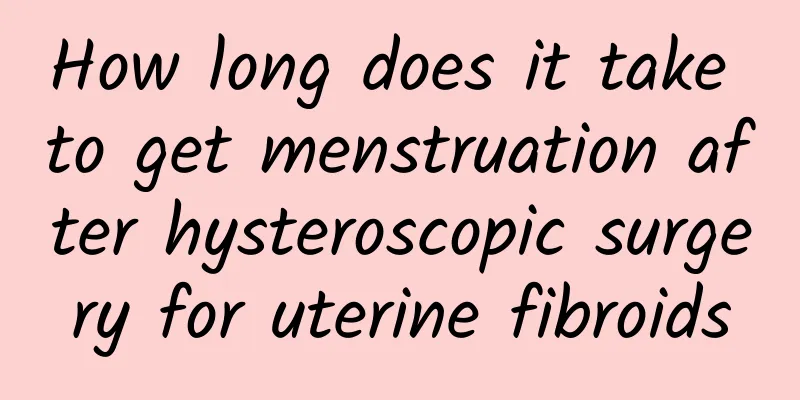How long does it take to get menstruation after hysteroscopic surgery for uterine fibroids

|
After hysteroscopic surgery for uterine fibroids, you may have menstruation two to three months later. The specific time of menstruation varies from person to person and should be judged based on your own situation. 1. Two months: Uterine fibroids are benign tumors formed by the proliferation of uterine smooth muscle tissue. They may be caused by genetics, hormone stimulation, stem cell abnormalities, etc. The condition is relatively serious. Conservative treatment cannot improve the volume of uterine fibroids. If the size is 4 cm or larger, hysteroscopic surgery is required. The surgery may cause damage to the endometrium. If the damage is minor and the individual is in good physical condition, it will generally recover in about two months and menstruation can begin. 2. Three months: During hysteroscopic surgery for uterine fibroids, the damage to the endometrium is quite serious, which may cause the endometrium to thin. After the operation, the endometrium may not be thick enough under the influence of progesterone secreted by the ovaries, thus affecting menstruation. It may take about three months for the endometrium to recover and menstruate normally. Pay more attention to rest after the operation, and eat fresh foods with high phytoestrogen content, such as beans, honey, etc. If other discomfort symptoms occur after the operation, you need to see a doctor as soon as possible. |
<<: How to make sure the flow is clean
>>: What causes uterine fibroid rupture?
Recommend
[Video version] Nutrition and calorie comparison between frozen tofu and fresh tofu!
Are you worried about gaining weight year after y...
What are the symptoms of miscarriage?
All female friends who have been pregnant know th...
Is medication currently a good treatment for mild cervical erosion?
Since mild cervical erosion has a great impact on...
What medicine should I take to control and treat uterine mucosal fibroids? Treatment methods for uterine mucosal fibroids
Uterine mucosal fibroids are a common gynecologic...
What causes cervical erosion?
Cervical erosion is the most common disease in wo...
Increase satiety! Eat 3 "Ingredients That Make You Bulk"
The most difficult part in losing weight is proba...
Fatigue and can’t get rid of your belly? Regulate hormones in 3 weeks to activate youth and delay aging
No matter how much you sleep, you still feel tire...
Which women are more likely to suffer from uterine fibroids?
Generally, women aged 30-50, who sit for a long t...
Detailed explanation of common examination items for cervical hypertrophy
At present, the incidence of cervical hypertrophy...
The three main causes of adnexitis
Adnexitis refers to inflammation of the fallopian...
What is the treatment for irregular menstruation? 4 causes of irregular menstruation
Causes and treatment of irregular menstruation So...
What are the clinical symptoms of endometriosis?
Endometriosis has a serious impact on women's...
Lose weight here! 10 practical tips for you
Losing weight and slimming down is actually not t...
How does vaginitis develop?
How does vaginitis develop? Vaginitis may be caus...
Is it better to have abortion by surgery or by medicine?
Surgical abortion and medical abortion each have ...









